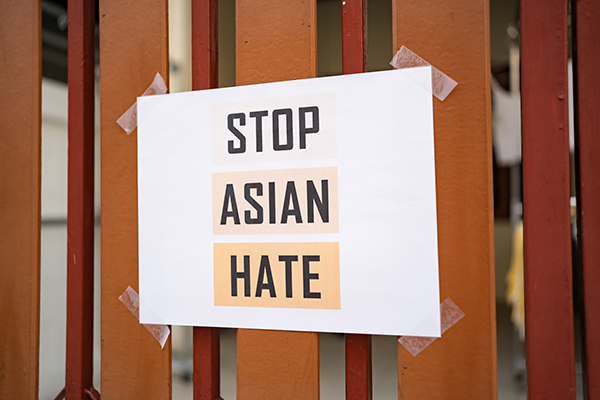
Since the COVID-19 pandemic began, there has been an increased number of reported attacks on Asian Americans and Pacific Islanders (AAPI). According to data released on March 16, 2021, there have been over 3,700 first-hand accounts of anti-Asian hate from all 50 states and the District of Columbia.
Many in our community are suffering, and we are collectively horrified that the surge in violence against AAPIs is a growing crisis. Yesterday, I saw the heartbreaking news that eight people were murdered in Atlanta, Georgia – and six of the eight victims were Asian women. I am uplifted by my non-AAPI colleagues who are true allies and have shown their support and solidarity during these dark times. They immediately reached out to check on me and acknowledge the pain that I am going through. My phone beeped with a text message from a colleague, “There is so much divide and hate right now. I know what it’s like for people to continue working and carrying on like life is normal when your people and community are under attack. If we want to see a change, we have to make it happen.”
As leaders and organizations continue to grapple with the ongoing impact of the pandemic on all aspects of our lives, Employee Resource Groups (ERGs) can take steps to respond and support their members who are processing and navigating the trauma of recent events. Here are a few:
- Acknowledge and respond to the situation directly and clearly. Avoid referring to what is going on in broad strokes. For example, a generic statement such as, “given the recent violence in the country” may cause unintended harm as you tiptoe around the message. We may not have all the answers but speaking directly shows that the experiences and feelings of others matter. Something as simple as checking in with them via e-mail can go a long way to letting people know you care. Consider dedicating the next meeting to a time of sharing experiences, feedback, and reflections, but be sensitive that individuals process differently and not everyone will participate in the same way.
- Connect with other ERG leaders. Injustices, discrimination and racism are not limited to any one group, and fostering allyship is the start to understanding the factors that contribute to systemic inequalities. While our experiences in dealing with racism are individual, they are part of a larger system of systematic oppression. While the structures that keep our communities down may look different, it is still the same broken system that prohibits us from writing our own stories. Our vulnerability should motivate us to reach out and connect with each other. If your ERG is planning an event or releasing a statement, reach out to other ERG leaders (e.g., NIH Chapter of Blacks in Government, NIH ABILITIES) to ask for their feedback and, if relevant, invite participation from their group. Together, acknowledge the shared pain and thoughtfully advocate for justice.
- Schedule intentional learning. Many of us are familiar with journal clubs where dedicated time is set aside to discuss research papers and exchange thoughts, ideas and generate discussion. Like how journal clubs function to increase exposure to rapidly evolving science and grow knowledge and literature awareness through peer-based group discussion, setting aside to learn about the factors and causes behind the rise in anti-Asian rhetoric and violence can be an effective learning and teaching tool. A newly published report, "A Rising Tide of Hate and Violence against Asian Americans in New York During COVID-19,” contains a foreword written by Frank H. Wu, President of Queens College, City University of New York. This piece is not only a personal perspective of someone growing up impacted by the murder of Vincent Chin but discusses the history and underpinning of anti-Asian violence.
We hope this post can be a resource for ERG leaders looking for ways to support their members and community during these challenging times. It is also important to recognize that these recent acts of xenophobia directed at AAPI communities are not new and brought on by the COVID-19 pandemic, but that the AAPI experience in the United States has been fraught with bigotry that extends back many years.
Below are a few resources to help you learn more:
- Adapt Your D&I Efforts to the Reality of the Crisis
- How U.S. Companies Can Support Employees of Color Through the Pandemic
- Memorandum Condemning and Combating Racism, Xenophobia, and Intolerance Against Asian Americans and Pacific Islanders in the United States
- Resources for the Asian American Community on Anti-Blackness
- The history of tensions — and solidarity — between Black and Asian American communities, explained
- The EDI Advancing Racial Equity Page
Do you have a story idea for us? Do you want to submit a guest blog? If it's about equity, diversity, or inclusion, please submit to edi.stories@nih.gov.
For news, updates, and videos, follow or subscribe to EDI on: Twitter, Instagram, Blog, YouTube.






